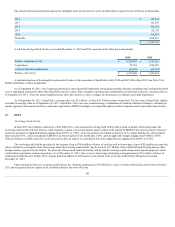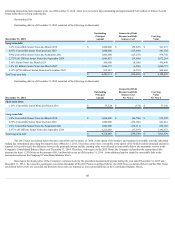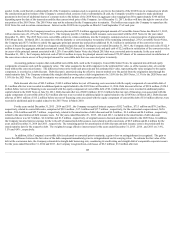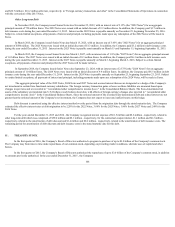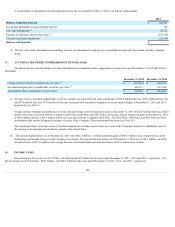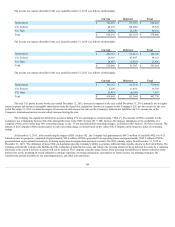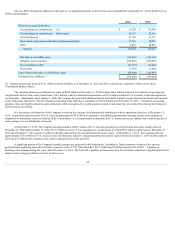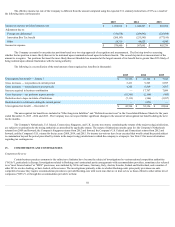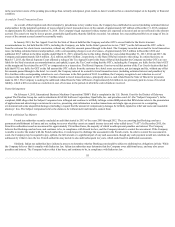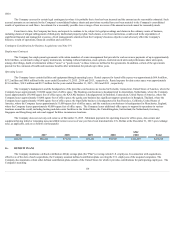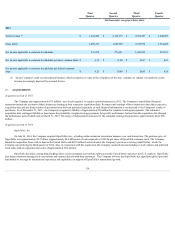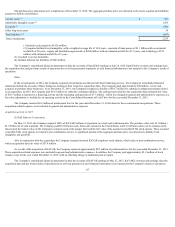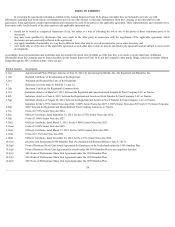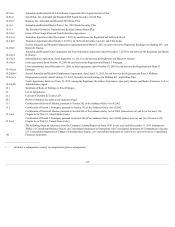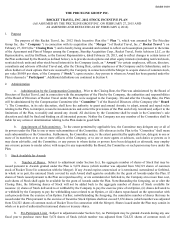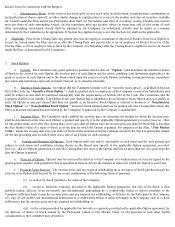Priceline 2015 Annual Report Download - page 116
Download and view the complete annual report
Please find page 116 of the 2015 Priceline annual report below. You can navigate through the pages in the report by either clicking on the pages listed below, or by using the keyword search tool below to find specific information within the annual report.
On April 21, 2015, the French, Italian and Swedish NCAs, working in close cooperation with the European Commission, announced that they had
accepted "commitments" offered by Booking.com to resolve and close the investigations in France, Italy and Sweden. Under the commitments, Booking.com
replaced its existing price parity agreements with accommodation providers with "narrow" price parity agreements. Under a "narrow" price parity agreement,
subject to certain exceptions, an accommodation provider is still required to offer the same or better rates on Booking.com as it offers to a consumer directly
online, but it is no longer required to offer the same or better rates on Booking.com as it offers to other OTCs. The commitments also allow an accommodation
provider to, among other things, offer different terms and conditions (e.g., free WiFi) and availability to consumers that book with on-line travel companies that
offer lower rates of commission or other benefits, offer lower rates to consumers that book through off-line channels and continue to discount through, among other
things, accommodation loyalty programs, as long as those rates are not published or marketed online. The commitments apply to accommodations in France, Italy
and Sweden and were effective on July 1, 2015. The foregoing description is a summary only and is qualified in its entirety by reference to the commitments
published by the NCAs on April 21, 2015.
Booking.com is in ongoing discussions with various NCAs in other countries regarding their concerns. On July 1, 2015, Booking.com voluntarily
implemented the commitments given to the French, Italian and Swedish NCAs throughout the European Economic Area and Switzerland and is working with
certain other European NCAs towards closing their investigations or inquiries. In October 2015, the Irish NCA closed its investigation on the basis of commitments
by Booking.com identical to those given to the French, Italian and Swedish NCAs. In November 2015, the Swiss NCA closed its investigation, prohibiting any
reintroduction of Booking.com's old "wide" parity agreements but permitting Booking.com to retain its existing "narrow" parity agreements with accommodations
in Switzerland. A number of additional NCAs in the European Economic Area have now closed their investigations following Booking.com's implementation of
the commitments in their jurisdictions. However, the Company is currently unable to predict the impact the implementation of these commitments throughout the
European Economic Area and Switzerland will have on Booking.com's business or on the on-going investigations in other European countries, or on industry
practice more generally. On December 23, 2015, the German NCA issued a final decision prohibiting Booking.com's "narrow" price parity agreements with
accommodations in Germany. The German NCA did not issue a fine, but has reserved its position regarding an order for disgorgement of profits. Booking.com
intends to appeal the German NCA’s decision. An Italian hotel association has appealed the Italian NCA's decision to accept the commitments by Booking.com.
The Company is unable to predict how these appeals and the remaining investigations in other countries will ultimately be resolved. Possible outcomes include
requiring Booking.com to amend or remove its rate parity clause from its contracts with accommodation providers in those jurisdictions and/or the imposition of
fines.
In August 2015, French legislation known as the "Macron Law" became effective. Among other things, the Macron Law makes price parity agreements
illegal, including the "narrow" price parity agreements agreed to by the French NCA in April 2015. The law also requires that agreements between OTCs and
hotels comply with a French agency contract form. Similar legislation prohibiting "narrow" price parity agreements has been proposed in Italy and currently is
awaiting action by the Italian Senate. It is not yet clear whether the Macron Law or the proposed Italian legislation may affect our business in the long-term in
France and Italy, respectively.
Litigation Related to Travel Transaction Taxes
The Company and certain third-party OTCs are currently involved in approximately forty lawsuits, including certified and putative class actions, brought
by or against U.S. states, cities and counties over issues involving the payment of travel transaction taxes (e.g., hotel occupancy taxes, excise taxes, sales taxes,
etc.). Generally, the complaints allege, among other things, that the OTCs violated each jurisdiction's respective relevant travel transaction tax ordinance with
respect to the charge and remittance of amounts to cover taxes under each law. The Company believes that the laws at issue generally do not apply to the services it
provides, namely the facilitation of travel reservations, and, therefore, that it does not owe the taxes that are claimed to be owed. However, the Company has been
involved in this type of litigation for many years, and state and local jurisdictions where these issues have not been resolved could assert that the Company is
subject to travel transaction taxes and could seek to collect such taxes, retroactively and/or prospectively. From time to time, the Company has found it expedient
to settle, and may in the future agree to settle, claims pending in these matters without conceding that the claims at issue are meritorious or that the claimed taxes
are in fact due to be paid.
Litigation is subject to uncertainty and there could be adverse developments in these pending or future cases and proceedings. An unfavorable outcome or
settlement of pending litigation may encourage the commencement of additional litigation, audit proceedings or other regulatory inquiries and also could result in
substantial liabilities for past and/or future bookings, including, among other things, interest, penalties, punitive damages and/or attorneys’ fees and costs. An
adverse outcome in one or more of these unresolved proceedings could have an adverse effect on our results of operations or cash flow in any given operating
period. However, the Company believes that even if the Company were to suffer adverse determinations
112


